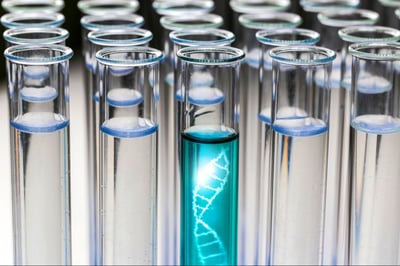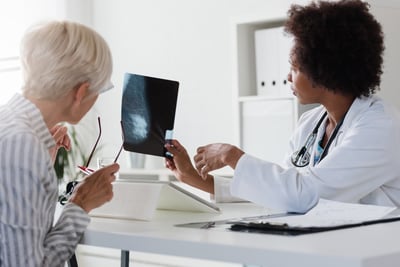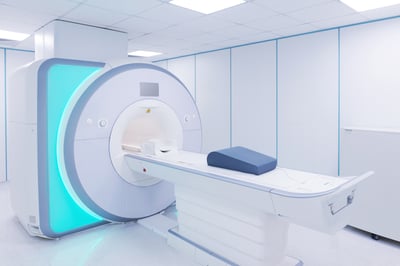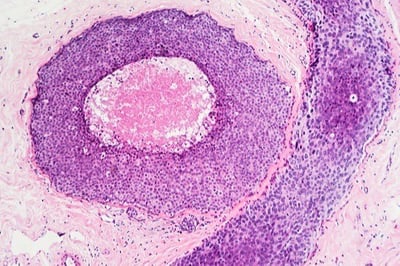FORCE's eXamining the Relevance of Articles for You (XRAY) program looks behind the headlines of cancer news to help you understand what the research means for you.
XRAY is a reliable source of hereditary cancer research-related news and information.
Learn more about the XRAY program
In portal: Breast Cancer, Categories Screening
Relevance: Medium-High


Strength of Science: Medium-High


Research Timeline: Post Approval


Study : New tool to predict breast cancer risk for Black women
Relevance: Medium-High


Strength of Science: Medium-High


Research Timeline: Post Approval


Most relevant for: Black women in the U.S.
An important part of making decisions about breast cancer screening and prevention is knowing your breast cancer risk. Specific tools are used to identify people who would benefit from early and/or additional screening and chemoprevention or those who would most benefit from genetic counseling and testing. Because these tools were developed using data mostly from white women, they are unable to predict cancer risk as well for Black women. To begin to address these gaps, researchers developed a new tool specifically designed to predict breast cancer risk for Black women. This tool has been shown to work well, especially for younger Black women. (posted 3/22/2022) Este artículo está disponible en español.
Read More
Update : Blood tests called liquid biopsies for cancer screening, monitoring and treatment
Most relevant for: People considering a liquid biopsy to screen for cancer
Could a simple blood test change cancer detection, treatment and monitoring? Several companies are offering a type of blood test known as a liquid biopsy to detect multiple cancers at their earliest stages, monitor response to treatment and help choose the best treatment. Although progress has been made using liquid biopsies to treat cancer, these tests have not yet been shown to detect cancer early enough to save lives. (posted 9/29/21)
Este artículo está disponible en español.
Read More
Relevance: High


Strength of Science: High


Research Timeline: Post Approval


Study : Cancer risks of people with inherited PALB2 mutations
Relevance: High


Strength of Science: High


Research Timeline: Post Approval


Most relevant for: people with inherited PALB2 mutations
In the largest study of people with inherited PALB2 mutations to date, the gene was linked to increased lifetime risk of breast cancer in women and men, ovarian and pancreatic cancer but not prostate or colorectal cancer. (posted 7/1/21)
Este artículo está disponible en español.
Read More
Relevance: High


Research Timeline: Post Approval


Guideline : Expert guidelines on COVID-19 vaccines and timing of breast screening tests
Relevance: High


Research Timeline: Post Approval


Most relevant for: People considering screening mammography after getting a COVID-19 vaccine.
COVID-19 vaccines work by helping the immune system destroy the virus. Lymph nodes are an important part of the immune system. COVID-19 vaccines may cause temporary swelling in some lymph nodes, which may look suspicious on a mammogram. The Society for Breast Imaging and other professional organizations have released recommendations for the timing of mammograms after COVID-19 vaccines. (3/30/21)
Este artículo está disponible en español.
Read More
Relevance: Medium-High


Strength of Science: Medium-High


Research Timeline: Post Approval


Study : Knowing about an inherited BRCA mutation improves outcomes for women with breast cancer
Relevance: Medium-High


Strength of Science: Medium-High


Research Timeline: Post Approval


Most relevant for: Young women with, or at high risk for an inherited BRCA mutation
Inherited mutations in the BRCA1 and BRCA2 genes are linked to a high lifetime risk of breast and other cancers. This study shows that women who know that they have a BRCA mutation before they are diagnosed with breast cancer have improved outcomes including diagnosis at earlier stages and improved overall survival. (10/26/20)
Read More
Relevance: High


Strength of Science: Medium-High


Research Timeline: Post Approval


Study : What is the risk for a new breast cancer diagnosis in the other breast for women with a BRCA1, BRCA2 or TP53 mutation?
Relevance: High


Strength of Science: Medium-High


Research Timeline: Post Approval


Most relevant for: Women diagnosed with breast cancer who have a mutation in BRCA1, BRCA2 or TP53
For women who have been diagnosed with breast cancer, knowing their risk of breast cancer in the other (contralateral) breast can help them make decisions about surgery and screening. This study shows that women with an inherited mutation in BRCA1, BRCA2 or TP53 have an increased risk for contralateral breast cancer. This risk is highest in women with a TP53 mutation. (6/6/20)
Read More
Relevance: Medium-High


Strength of Science: Medium-High


Research Timeline: Human Research


Study : Cancer risk associated with inherited mutations in Lynch syndrome genes
Relevance: Medium-High


Strength of Science: Medium-High


Research Timeline: Human Research


Most relevant for: People with Lynch syndrome mutations
Lynch syndrome is the most common inherited cause of cancer affecting about 1 in 300 people. People with Lynch syndrome have an increased risk of colorectal endometrial and other cancers. A large study followed people with mutations in the Lynch syndrome genes MLH1, MSH2, MSH6 and PMS2 to determine the risk of other types of cancer. (2/21/20)
Read More
Relevance: High


Strength of Science: Medium-High


Research Timeline: Post Approval


Study : MRI or mammograms for detecting breast cancer in families with unknown genetic mutations?
Relevance: High


Strength of Science: Medium-High


Research Timeline: Post Approval


Most relevant for: People with a personal or family history of cancer where no mutation has been found
MRI and mammograms are used together to detect breast cancer in high-risk women who test positive for a BRCA or other gene mutation that increases the risk for breast cancer. For women with a family history of breast cancer but no known genetic mutation, increased screening is recommended. But what method is best? A recent clinical trial in the Netherlands compared MRI and mammography for this population. (8/15/19)
Read More
Relevance: Medium-High


Strength of Science: Medium-High


Study : Diagnosis and treatment delays in young women with breast cancer
Relevance: Medium-High


Strength of Science: Medium-High


Most relevant for: Young women who find a breast lump and young women newly-diagnosed with breast cancer
Young women are more likely to have delays in a breast cancer diagnosis and treatment. Factors that affect these delays include pregnancy, breastfeeding, financial concerns and having a family history of breast or ovarian cancer. (8/5/19)
Este artículo está disponible en español.
Read More
Relevance: Medium-High


Quality of Writing: Medium-High


Personal Story : A young woman's story of genetic testing and risk-reducing mastectomy
Relevance: Medium-High


Quality of Writing: Medium-High


Most relevant for: Young women of color with a BRCA mutation
Alejandra Campoverdi comes from a family with three generations of breast cancer. As a former White House aide and active educator in the Latina community, she has openly shared her story of genetic testing, her BRCA2 mutation and her plans for risk-reducing mastectomy at age 39. (6/6/19)
Este artículo está disponible en español.
Read More